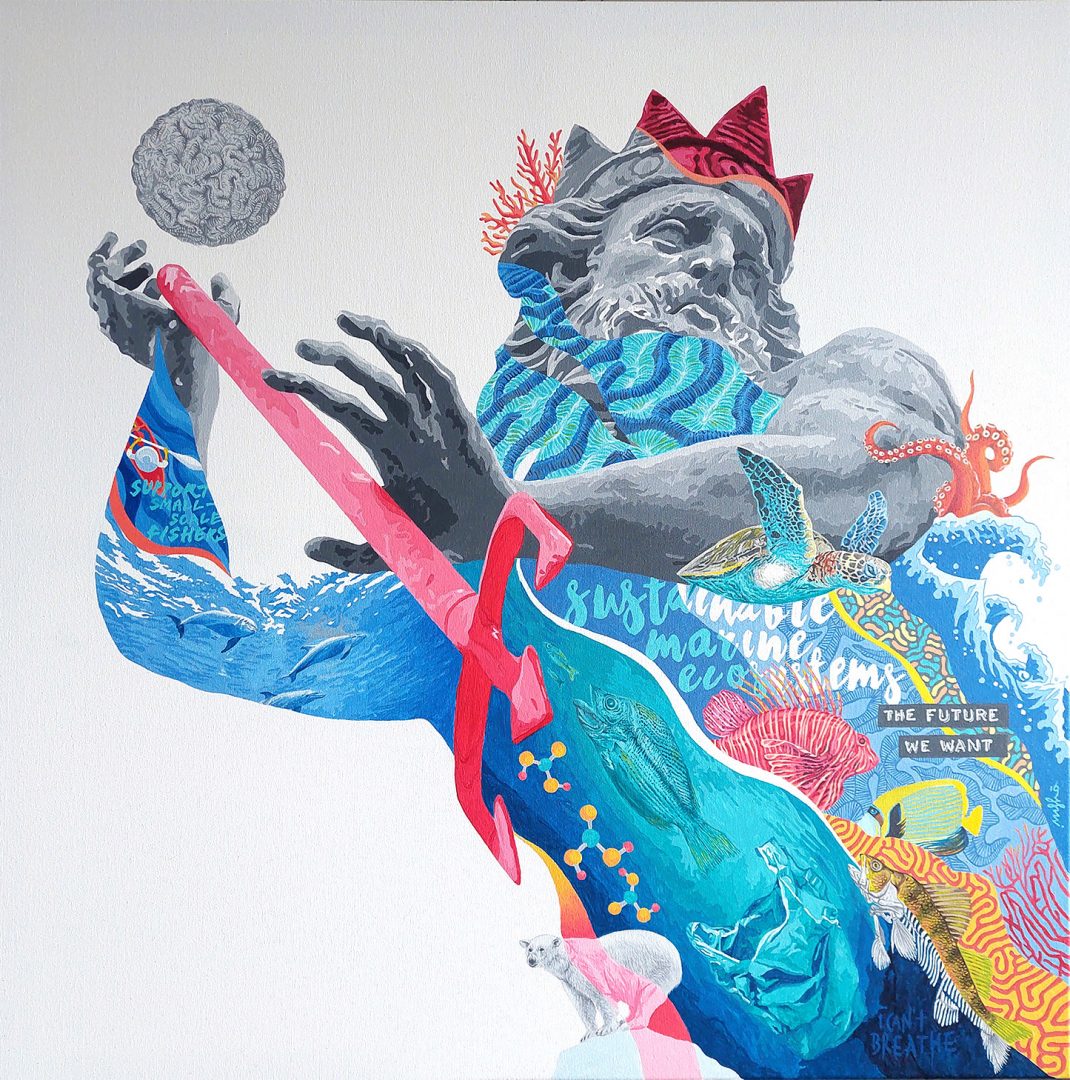Welcome to the Social Art Award 2025 – Online Gallery!
We are grateful for the many powerful contributions from artists across the globe. The selected works reflect the diversity of contemporary social art practices and address urgent issues such as climate and water crises, social and economic inequality, migration, conflict, discrimination, and the protection of human and more-than-human life.
Below you will find the submissions from the edition of 2024/2025 that passed the initial jury round. The Online Gallery offers public visibility to these works and supports dialogue around their themes; it does not replace the final jury decision.
Thank you to all artists for sharing your inspiring and committed work. We invite you to explore the gallery and engage with the perspectives shaping the Social Art Award 2025.
Poseidon14
insho
Coral reefs are an integral part of the marine ecosystem - they have needs like any other living things and due to climate change, their lives are at stake. Poseidon 14 has been inspired from SDG 14, the urgent call for action by the United Nations aiming at the conservation and sustainable use of our oceans, sea and marine resources for sustainable development. In addition to depicting the aesthetic nature of the coral reef and marine ecosystems, Poseidon 14 also highlights the following pressing issues which are severely impacting the survival of coral reefs and ecosystem as a whole: Plastic pollution - Plastic debris in the oceans (estimated at an alarming 8 million tons every year) carry bacteria which cause coral disease leading to rapid coral mortality. Ocean Acidification and Dead Zones - Increasing carbon emissions lead to oceans absorbing more carbon dioxide from the atmosphere, thus increasing the acidity of seawater and decreasing its ability to hold calcium carbonate (an essential component used by various species, including corals to build protective shells) Melting Polar Ice Caps - Most coral reefs are incapable of growing quickly enough to compensate for rising sea levels triggered by global warming. Dolphins and Climate Change - Potential impacts of climate change may be less available habitat for several species of dolphins, increasing susceptibility to diseases and reduced reproductive success. Brain Coral - The polyps forming the brain corals are highly associated to one another, their tissues being closely connected than those of other corals and are not separated by skeletal structures. This tissue integration unfortunately also leads to vulnerability, because if even one polyp gets sick, the disease can quickly spread to the rest of the colony. Coral Reef Biodiversity - Sea Turtles, reef fish and octopuses are critical to the biodiversity of the ocean and are major contributors to healthy ecosystems. Supporting Small-Scale Fishers - They may be more sustainable than their industrial counterparts as they use less resources and have a smaller carbon footprint.
Coral reefs are an integral part of the marine ecosystem - they have needs like any other living things and due to climate change, their lives are at stake. Poseidon 14 has been inspired from SDG 14, the urgent call for action by the United Nations aiming at the conservation and sustainable use of our oceans, sea and marine resources for sustainable development. In addition to depicting the aesthetic nature of the coral reef and marine ecosystems, Poseidon 14 also highlights the following pressing issues which are severely impacting the survival of coral reefs and ecosystem as a whole: Plastic pollution - Plastic debris in the oceans (estimated at an alarming 8 million tons every year) carry bacteria which cause coral disease leading to rapid coral mortality. Ocean Acidification and Dead Zones - Increasing carbon emissions lead to oceans absorbing more carbon dioxide from the atmosphere, thus increasing the acidity of seawater and decreasing its ability to hold calcium carbonate (an essential component used by various species, including corals to build protective shells) Melting Polar Ice Caps - Most coral reefs are incapable of growing quickly enough to compensate for rising sea levels triggered by global warming. Dolphins and Climate Change - Potential impacts of climate change may be less available habitat for several species of dolphins, increasing susceptibility to diseases and reduced reproductive success. Brain Coral - The polyps forming the brain corals are highly associated to one another, their tissues being closely connected than those of other corals and are not separated by skeletal structures. This tissue integration unfortunately also leads to vulnerability, because if even one polyp gets sick, the disease can quickly spread to the rest of the colony. Coral Reef Biodiversity - Sea Turtles, reef fish and octopuses are critical to the biodiversity of the ocean and are major contributors to healthy ecosystems. Supporting Small-Scale Fishers - They may be more sustainable than their industrial counterparts as they use less resources and have a smaller carbon footprint.



